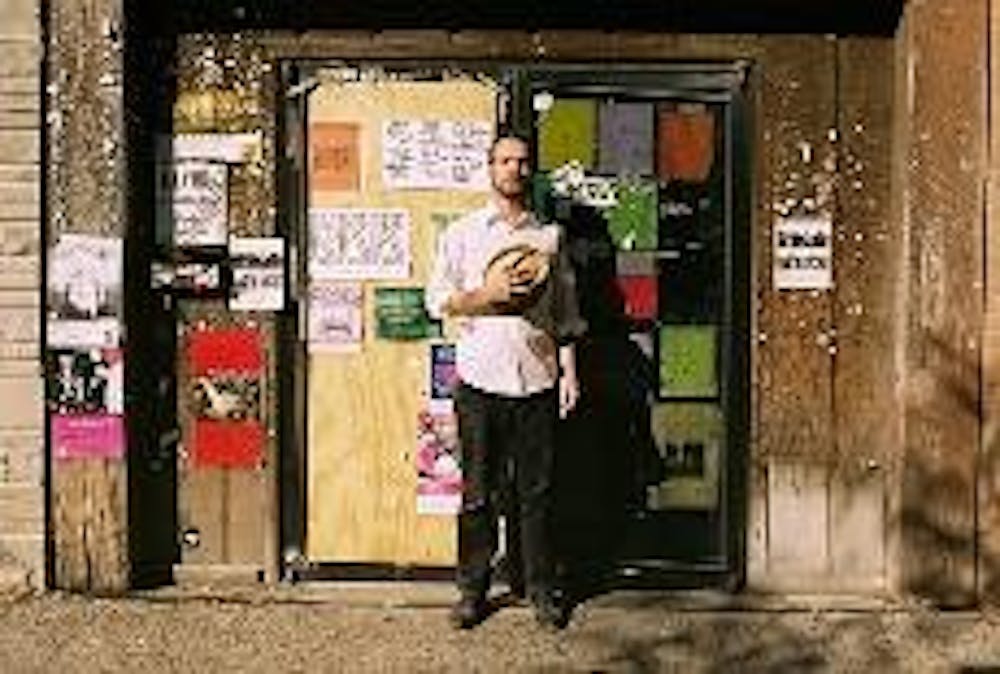There is a hush that comes over the crowd as William Elliot Whitmore takes the stage. He is alone, with only his guitar, banjo and glass of whiskey. The audience is mainly dressed in skinny jeans and sneakers, mixed with an older, bar-going crowd. By the fourth song, Whitmore has captivated his audience and nearly everyone is clapping, stomping and whistling as he croons "Johnny Law."
Finding American Roots
Whitmore grew up on a 150-acre farm along the Mississippi and lives there to this day. He is a self-described "son of the soil," influenced deeply by the spiritual connection between man and nature.
"Growing up in Iowa is beautiful," Whitmore said. "It's the center of my spiritual universe, that's for sure."
Whitmore's most recent album, last August's "Song of the Blackbird," is the third album in a trilogy released on Southern Records. Dealing with the death of his parents in his late teens, Whitmore channeled his emotions into music. He released "Hymns for the Hopeless" followed by "Ashes to Dust," and spends every moment he's not recording on tour. Whitmore's hard work has garnered him favorable reviews and a growing fan base.
"This is American folk music stripped to its basics but freed of any stultifying reverence," wrote WIRE magazine on Whitmore's talents. "Whitmore writes original songs which sound timeless in a voice which doesn't fit his comparative youth."
Whitmore is no act. He sings what he knows about: life, loss, love and loneliness. It is his genuine character that makes his music so powerful, for as Whitmore himself sings, "The bluebird can sing, but the crow's got the soul."
Whitmore cites Vienna, London and other European capitals as his favorite cities to play during his recent travels on the Twisted Folk tour.
"I've been over to Europe about 10 times now and I always enjoy playing over there," Whitmore said. "I'm always on the road with little bits at home--just keep striking while the iron is hot. It's the only way I can pay my gambling debts. I feel very fortunate."
Folkways Abroad
Despite Whitmore's Americana roots, he was "surprised by how cordial people were."
"I didn't know how people were going to react to me as an American, let alone as a Midwesterner. Those first tours were in 2003, around when this bullshit war started happening. It's like 'Oh no! We didn't even vote for him!' I just try to be an ambassador for my country," Whitmore said.
"I think people can separate the redneck ethos from country music. They know that there's a pure level of America where people like you and me exist and just want to live, be happy, play our little music, and have a good time," he said on his role as a folk singer from a country with a potentially volatile international nonappeal.
But despite the existential bliss of country music values, Whitmore is aware of how people in urban communities feel about his music.
"I think country resonates really highly with folks in the city because they don't have a connection as much to the earth," Whitmore said. "I mean, they can go to the park, but that's not the same. So they really appreciate roots music in the way that they can listen, or come to my show, and feel that connection through the music. They can experience it through my eyes. Even in New York where you don't expect people to be able to find Iowa on a map, I've always had good shows."
When Americana meets Electronica
Whitmore's success as a musician is slowly blossoming. With albums and a tour under his belt, he said he feels he can start appreciating the fruits of his labor but he still maintains a simple lifestyle that represents the core perspectives of his work.
"I don't really have a computer and the cabin I live in has no running water or electricity," Whitmore said. "I live a pretty simple lifestyle. I can't even physically book shows for myself anymore. It's great to just focus on music and not have to worry about the clerical aspects of the business. It never ceases to amaze me that people show up. I can't believe anyone would want to hear this stuff and I'm so honored that they do."
The Americana style is classic Whitmore, but the future may hold more for this somewhat experimental musician. He said he is interested in "experimenting more with crazy things like electronic-type sounds mixed in with the banjo and guitar." Whitmore said that he hopes to record more music this summer with cousin and "partner in crime" Luke Tweedy.
"The summers are my Huckleberry Finn time to go fishing, not wear shoes and write music," Whitmore said.
Old Man in a Young Body
The most striking thing coming from this prolific musician is his vocal delivery. The sound could be described as an 80-year-old man trapped in a 28-year-old's body. Whitmore says that this gravely sound comes from a culmination of a lot of bad habits, some of which he's kicked, some of which he still has but none that he regrets.
"Ever since I can remember I've been singing," Whitmore said. "Even as a little kid, I can remember running around and hollerin' my fool head off. After awhile, it started to mess with my pipes. I used to wish I could sing like Dean Martin, but I realized I have to use what I've got."
"It ain't the prettiest horse in the pasture, but it'll plow the field."
Eagle Staff Writer Jen Turner contributed to this report.





